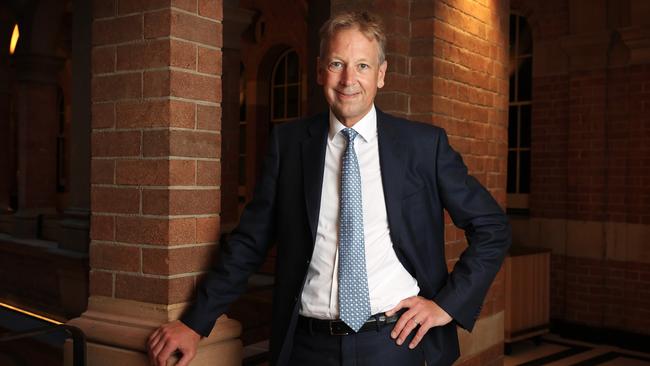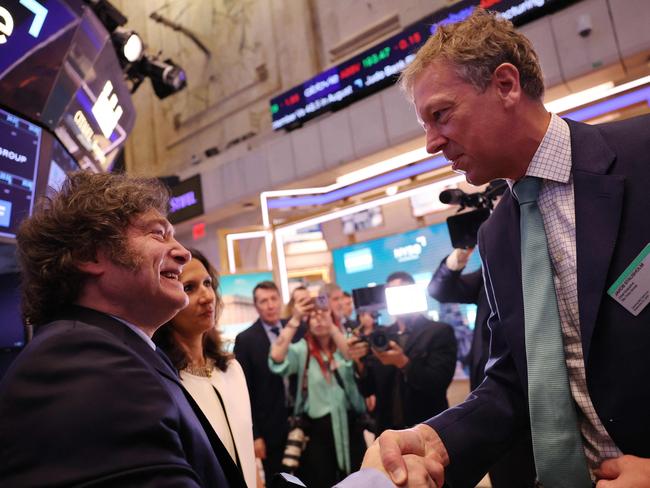Rio Tinto boss Jakob Stausholm’s big lithium bet will play out over decades
Rio Tinto now becomes one of the world’s most influential lithium producers bringing balance sheet heft and credibility to the temperamental metal.

Business
Don't miss out on the headlines from Business. Followed categories will be added to My News.
Rio Tinto boss Jakob Stausholm laid the groundwork for his $US6.7bn ($10bn) lithium deal by a short meeting with Argentinian President Javier Milei at the New York Stock Exchange about two weeks ago.
That ended on a strong note, with Milei seeking to woo big foreign investors like Rio. It was followed up with meetings in Rio’s London offices between the Rio boss and five provincial governors from Argentina’s key mining provinces.
Now Rio Tinto is set to become one of the world’s most influential lithium producers as it brings its balance sheet heft, marketing and credibility to the temperamental metal that is still finding its way as a commodity. And Argentina, with its lithium-rich brine pools, is central to Rio’s plans.
Talks were already under way with Australian-US lithium play Arcadium when Stausholm met Milei, and following a confirmation earlier this week that price discovery had begun, Rio has delivered what it regards as knockout cash bid of $US5.85 a share for the miner.
This won backing of the Arcadium board, led by former Woodside boss Peter Coleman. It represents a 90 per cent premium to the pre-bid price. While some Arcadium shareholders were agitating for something closer to $6 a share, the cash incentive in the middle of a depressed market gives Arcadium shareholders the opportunity to exit, albeit at a discount to last year’s merger that created Arcadium.
With lithium prices and therefore share valuations so depressed – off 80 per cent from recent highs – Stausholm tells The Australian “it’s not the worst time of the cycle to enter lithium at scale”.
Rio has made its approach at a time Arcadium faces the double hit of collapsed lithium prices and a heavy capex phase for the lithium major.
With less revenue coming in the door and more going out to pay for its Argentinian processing project and other manufacturing sites across North America and Canada, Arcadium had been expected to be cashflow-negative at least for the next four years.
Arcadium only came about this year. The lithium player’s chairman Coleman says the company wasn’t up for sale and it was well funded to see through development over coming years.
Coleman told The Australian that Rio’s approach was based on fundamental asset value of the company rather than looking at a premium, given where lithium prices were at today.
“The bottom line is it’s an opportunity now to bring forward that value for investors. It’s an opportunity to derisk that future growth, and, just as importantly, to derisk the forward pricing on lithium. It’s quite uncertain at the moment. So we decided on balance, this is the best thing for our investors.”

Stausholm’s conviction on lithium hinges on his belief that the soft metal, used in large-scale batteries and electric vehicles, will be central to the world’s green energy transition.
Although lithium prices aren’t reflecting the same optimistic growth path, lithium producers argue that is more a factor of an oversupplied market than demand fundamentals, and a hockey stick recovery will follow. Stausholm tells The Australian he is looking at a price for lithium over decades, not just today.
“There will be a need for more batteries and there will be a lot of growth in demand for lithium. That means that new mines will have to be constructed,” the Rio Tinto boss says.
“We all feel comfortable that this is a risk worth taking.”
He calculates there will be 10 per cent annualised growth in demand for lithium out until 2040. While the market is likely to be oversupplied for the next few years, it will move back in balance shortly before 2030. Then by 2035 the demand gap widens significantly from what the world is able to supply.
Arcadium came onto his radar given the tier one nature of its assets and the prospect that they are at the low end of the cost curve. It is a specialist in direct lithium extraction technology which Rio is also using at the Rincon lithium project in Argentina that it acquired two years ago for $US825m and which is currently under development.
Arcadium too is one of the few global producers and the only US producer of battery-grade lithium hydroxide, giving car producers a choice for a non-Chinese battery supply chain. With five processing plants in operation and under development, the acquisition puts Rio Tinto right downstream in the production process – something rival miners like BHP or Glencore have stayed away from.
Indeed with lithium, Rio Tinto is now a key supplier of three core processed ingredients in carmaking, including copper and aluminium. “We have much more balance between the mining and the processing than many other of our peers,” Stausholm says.
“We’re very comfortable with the processing. And just think about our whole aluminium industry, which is mainly downstream, and Arcadium is really bringing skills to the table in terms of their downstream capabilities.
“When we looked around in the world we basically concluded that the best business model we could see was to get towards battery-grade lithium and that, of course, includes the processing.”
Rio’s chase for lithium while others are throwing everything at copper will be a test for Rio’s deal-making appetite again.
As a sub-$US10bn deal is not a big bite for a company like Rio, but it does rely on a lot of shareholder faith that the cycle will turn and that’s the best use of the company’s capex.
Stausholm points out that the deal will be partially debt funded and won’t affect the dividend payouts.
“We shouldn’t forget our dividend profile is a payout ratio of our earnings, and the whole intent of buying Arcadium is, of course, that over time we will grow our earnings and therefore also grow our dividends,” he says.
johnstone@theaustralian.com.au
Originally published as Rio Tinto boss Jakob Stausholm’s big lithium bet will play out over decades




